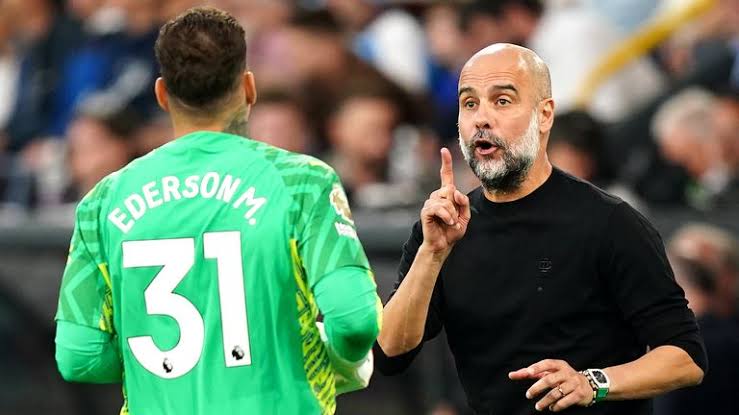Pep Guardiola shares players verdict after he took just three more touches than Ederson on Man City debut

The transfer window of 2025 brought significant excitement to Manchester City supporters when the club announced the signing of Rayan Cherki from Lyon. The 21-year-old French midfielder arrived at the Etihad Stadium with a reputation as one of Europe’s most promising young talents, carrying the weight of expectation that comes with being identified as a potential successor to Kevin De Bruyne’s creative genius. However, as football often reminds us, the transition from potential to performance is rarely seamless, and Cherki’s debut against Wydad AC in the FIFA Club World Cup served as a stark reminder of this reality.
Before analyzing Cherki’s debut performance, it’s crucial to understand the context surrounding his arrival at Manchester City. The French midfielder had been on the radar of Europe’s elite clubs for several years, with his technical ability, vision, and creativity making him a standout performer in Ligue 1. Gael Clichy, the former Manchester City defender, had gone as far as calling Cherki a “tactical weapon,” a description that heightened expectations among City’s fanbase.
The comparison to Kevin De Bruyne was inevitable. The Belgian maestro had been the creative heartbeat of Manchester City’s success under Pep Guardiola, and finding a suitable replacement for his unique skill set was always going to be a monumental task. Cherki’s profile suggested he possessed the technical attributes necessary to fill this void, but football history is littered with talented players who struggled to adapt to new environments and systems.
Manchester City’s decision to invest in Cherki represented more than just a transfer; it was a statement of intent about the club’s future direction. With De Bruyne entering the twilight of his career, identifying and developing his successor had become a priority for the club’s hierarchy. Cherki’s arrival was seen as the first step in ensuring continuity in City’s creative department.
The Lincoln Financial Field in Philadelphia provided the backdrop for Cherki’s first appearance in a Manchester City shirt. The FIFA Club World Cup match against Wydad AC was supposed to be a relatively straightforward encounter, offering the perfect opportunity for the young Frenchman to showcase his abilities in a City jersey. However, football rarely follows the script, and Cherki’s debut proved to be a challenging introduction to life under Pep Guardiola.
From the opening whistle, it was evident that Cherki was struggling to find his rhythm. His first touch, usually one of his strongest attributes, was uncharacteristically sloppy. The ball seemed to bounce off his feet rather than stick to them, a crucial issue for a player whose game is built on close control and intricate passing. This early struggle set the tone for what would become a frustrating evening for both player and manager.
The statistics from the match painted a concerning picture. Cherki recorded just 35 touches during his 60-minute appearance, barely more than goalkeeper Ederson, who managed 32 touches. For a creative midfielder expected to be the focal point of City’s attacking play, this lack of involvement was deeply troubling. The comparison to Ederson’s touch count became a talking point among fans and pundits, highlighting just how peripheral Cherki had been to City’s performance.
One of the most noticeable aspects of Cherki’s debut was his struggle with possession retention. The young midfielder lost the ball on several occasions, often in dangerous areas that could have led to counter-attacking opportunities for Wydad AC. These turnovers weren’t just statistical anomalies; they represented a fundamental disconnect between Cherki’s natural instincts and the tactical demands of Guardiola’s system.
Pep Guardiola’s Manchester City is built on a foundation of possession-based football, where every pass must have purpose and every touch must contribute to the team’s overall rhythm. Players are expected to make quick decisions, maintain the ball under pressure, and constantly seek progressive passing options. For a player making his debut, these demands can be overwhelming, particularly when combined with the natural nervousness that comes with representing a new club.
Cherki’s tendency to attempt flicks and tricks, while showcasing his technical ability, often worked against him in this context. These moments of individual flair, which had been celebrated during his time at Lyon, were met with visible frustration from Guardiola on the touchline. The Spanish manager’s exasperation was understandable; in his system, simplicity and effectiveness often trump individual brilliance, especially when the latter comes at the expense of team cohesion.
The young midfielder’s positioning also appeared problematic throughout the match. He often found himself in spaces that were already occupied by teammates or in areas where he couldn’t effectively influence the game. This spatial awareness issue is common among players adapting to new tactical systems, but it was particularly noticeable given the high expectations surrounding Cherki’s debut.
The media’s response to Cherki’s debut was swift and, at times, unforgiving. Various outlets criticized his performance, with many questioning whether Manchester City had made the right decision in pursuing his signature. The comparison to his predecessor’s legacy only intensified the scrutiny, with every touch and decision being analyzed through the lens of De Bruyne’s exceptional standards.
Jack Gaughan, writing for a prominent publication, captured the essence of Cherki’s struggles: “Guardiola seemed occasionally exasperated with the Frenchman for little flicks which lost cheap possession, yet City knew that is the sort of flair they bought from Lyon.” This observation highlighted the inherent tension between Cherki’s natural playing style and the tactical discipline required at Manchester City.
The criticism extended beyond individual moments to broader questions about his readiness for Premier League football. Some commentators suggested that the step up from Ligue 1 to the Premier League, combined with the pressure of replacing a club legend, might have been too significant for the young midfielder to handle immediately.
However, it’s important to note that not all media coverage was negative. Some outlets emphasized the challenging conditions of his debut and the need for patience when evaluating young players. The FIFA Club World Cup, played in unfamiliar surroundings with limited preparation time, was hardly the ideal environment for a player to showcase his abilities for the first time.
Despite the disappointing nature of Cherki’s debut, Pep Guardiola’s public response demonstrated both diplomatic skill and genuine belief in his new signing. When questioned by journalist Zach Lowy about the performance, Guardiola acknowledged the difficulty of replacing De Bruyne while expressing confidence in Cherki’s abilities.
“Well, of course, Kevin is difficult to replace, we know that for the quality he has, no doubt about that,” Guardiola stated. “But at the same time, the club decided for Rayan, he has incredible skills close to the box, great vision, passing, many, many things and it’s just the first game in tough, tough conditions. And I’m really pleased that he’s here.”
This response revealed several important aspects of Guardiola’s thinking. First, he acknowledged the impossibility of directly replacing De Bruyne, suggesting that expectations should be managed accordingly. Second, he highlighted specific qualities that attracted the club to Cherki, indicating that the decision to sign him was based on careful analysis rather than impulsive judgment. Finally, his emphasis on the challenging conditions of the debut suggested that he wasn’t reading too much into one performance.
Guardiola’s experience with integrating young players into his system has been extensive throughout his managerial career. From Barcelona’s La Masia graduates to Manchester City’s recent academy products, he has consistently shown patience with developing talent while maintaining high standards. His public backing of Cherki suggested that he viewed the debut as part of a longer-term development process rather than a definitive judgment of the player’s potential.
Football history is filled with examples of players who struggled in their debuts before going on to achieve great success. Even at Manchester City, recent history provides relevant examples. Erling Haaland’s debut against Liverpool in the Community Shield was notably underwhelming, with the Norwegian striker failing to make a significant impact. Critics questioned whether he could adapt to the Premier League’s physicality and pace, yet he went on to break numerous scoring records in his first season.
This precedent was explicitly referenced in discussions about Cherki’s debut, with Haaland himself reportedly making light of his own difficult start. The striker’s transformation from debut disappointment to prolific goalscorer served as a reminder that single performances, particularly debuts, rarely define a player’s career trajectory.
Other examples from Manchester City’s recent history include players like Riyad Mahrez, who took time to adapt to Guardiola’s system, and even Kevin De Bruyne himself, who needed several months to fully integrate into the team’s tactical framework. These examples suggest that patience and proper development are crucial factors in a player’s ultimate success.
To fully appreciate Cherki’s struggles, it’s essential to understand the tactical demands of Guardiola’s system. Manchester City’s approach requires midfielders to fulfill multiple roles simultaneously: they must be creative in the final third, defensively responsible in transition, and positionally disciplined in possession. This multifaceted role is particularly challenging for players accustomed to more freedom in their previous clubs.
Cherki’s experience at Lyon had been quite different from what he encountered at Manchester City. At Lyon, he had been given license to roam freely, to take risks, and to express his creativity without the same level of tactical constraint. The French club’s system allowed for more individual expression, which suited Cherki’s natural instincts and technical abilities.
The transition to Guardiola’s system requires players to suppress some of their natural impulses in favor of collective discipline. Every movement must be coordinated with teammates, every pass must serve the team’s tactical objectives, and every decision must be made with lightning speed. For a creative player like Cherki, this adjustment can be particularly challenging, as it requires balancing individual flair with tactical responsibility.
The positioning requirements in Guardiola’s system are also highly specific. Midfielders must understand when to drop deep to collect the ball, when to advance into attacking positions, and when to maintain their shape to provide defensive stability. This tactical intelligence typically develops over time through training and match experience, making it unrealistic to expect immediate adaptation.
The burden of expectation surrounding Cherki’s arrival at Manchester City cannot be understated. Being identified as De Bruyne’s potential successor brought with it enormous pressure that would challenge even the most experienced players. The Belgian midfielder’s legacy at the club is virtually unparalleled, with his creativity, leadership, and consistency having been instrumental in City’s success under Guardiola.
This pressure was magnified by the financial investment Manchester City had made in securing Cherki’s services. Modern football transfers carry enormous expectations, with fans and media expecting immediate returns on significant investments. The reality of player development, particularly for young talents adapting to new leagues and systems, often conflicts with these immediate expectations.
The psychological aspect of this pressure should not be overlooked. Playing for Manchester City means performing in front of some of the world’s most knowledgeable football fans, under the scrutiny of global media, and within a system that demands perfection. For a 21-year-old player making his debut, these factors can be overwhelming and may have contributed to his underwhelming performance.
Despite Cherki’s struggles, there were positive moments in his debut that suggested future potential. Journalist Jack Gaughan noted that Cherki’s pressing led to a clear-cut chance for Jeremy Doku, who unfortunately failed to convert the opportunity. This moment highlighted one of Cherki’s valuable attributes: his work rate and pressing intensity.
In modern football, creative midfielders are expected to contribute defensively as much as they do in attack. Cherki’s willingness to press and harass opponents, even while struggling with other aspects of his game, demonstrated his understanding of these modern demands. This defensive contribution, while perhaps not spectacular, showed that he was at least attempting to fulfill all aspects of his role.
The creation of chances for teammates, even if they aren’t converted, is another positive indicator for creative players. Cherki’s ability to create opportunities through his pressing and positioning suggested that his football intelligence remained intact despite his technical struggles. This aspect of his performance provided hope that his adaptation to City’s system might be more successful than his debut suggested.
Looking beyond the debut disappointment, Cherki’s future at Manchester City remains promising. The club’s track record of developing young talent under Guardiola’s guidance provides reason for optimism. Players like Phil Foden, who took time to establish himself in the first team, serve as examples of how patience and proper development can lead to success.
The key to Cherki’s development will be managing expectations while providing him with appropriate opportunities to adapt to the Premier League’s demands. This might involve gradually increasing his playing time, using him in specific tactical situations, and working intensively on the technical aspects of his game that need improvement.
Guardiola’s tactical system, while demanding, has proven capable of enhancing players’ abilities when they fully embrace its requirements. Cherki’s technical skills provide a strong foundation for this development, and his youth suggests that he has the time and capacity to make the necessary adjustments.
The club’s commitment to Cherki, demonstrated by their significant investment and Guardiola’s public support, indicates that they view his debut struggles as temporary setbacks rather than fundamental issues. This institutional backing will be crucial for his confidence and development in the coming months.
Rayan Cherki’s debut for Manchester City against Wydad AC was undoubtedly disappointing, both for the player and the club’s supporters. The statistics were concerning, the performance was underwhelming, and the media reaction was largely negative. However, football careers are not defined by single performances, and debuts are particularly poor indicators of future success.
The comparison to Ederson’s touch count, while stark, should be viewed in context. Debut performances are influenced by numerous factors including nerves, unfamiliarity with teammates, and the pressure of expectations. These factors are temporary and typically diminish as players become more comfortable in their new environment.
Guardiola’s measured response to the performance suggests that the club’s faith in Cherki remains intact. His acknowledgment of the challenging conditions and emphasis on the player’s technical abilities indicate that the debut will be treated as part of a longer-term development process rather than a definitive judgment.
The precedent set by other players who struggled in their debuts before achieving success at Manchester City provides additional reason for optimism. Haaland’s transformation from Community Shield disappointment to Premier League record-breaker demonstrates that initial struggles can be overcome with time and proper development.
For Cherki, the key will be learning from this experience while maintaining confidence in his abilities. The technical skills that made him attractive to Manchester City remain intact, and his youth suggests that adaptation is entirely possible. The challenge will be balancing his natural creativity with the tactical discipline required in Guardiola’s system.
The football world will continue to monitor Cherki’s development with interest. His debut may have been forgettable, but his potential remains significant. Whether he can fulfill that potential at Manchester City will depend on his ability to adapt, the club’s patience in his development, and the tactical adjustments that both player and system make over time.
In the end, Rayan Cherki’s Manchester City story is just beginning. The first chapter may have been disappointing, but the complete narrative remains to be written. Football history suggests that patience, proper development, and mutual adaptation often lead to success, even after unpromising beginnings.















